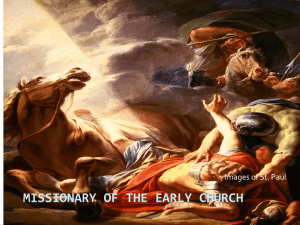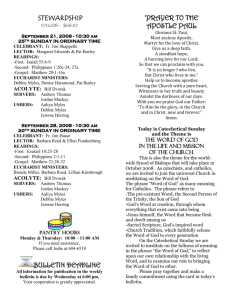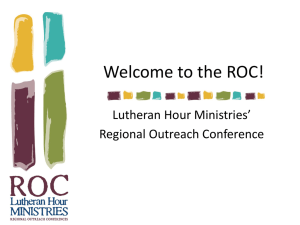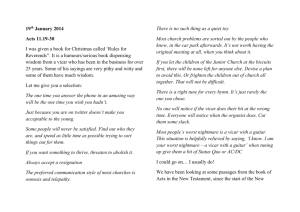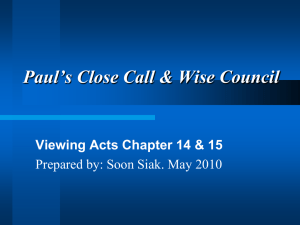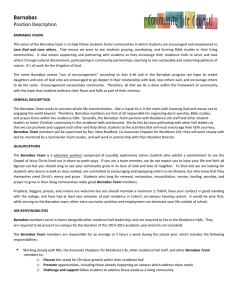Acts 11`19-30, 13`1-3 - North Central Christian Church
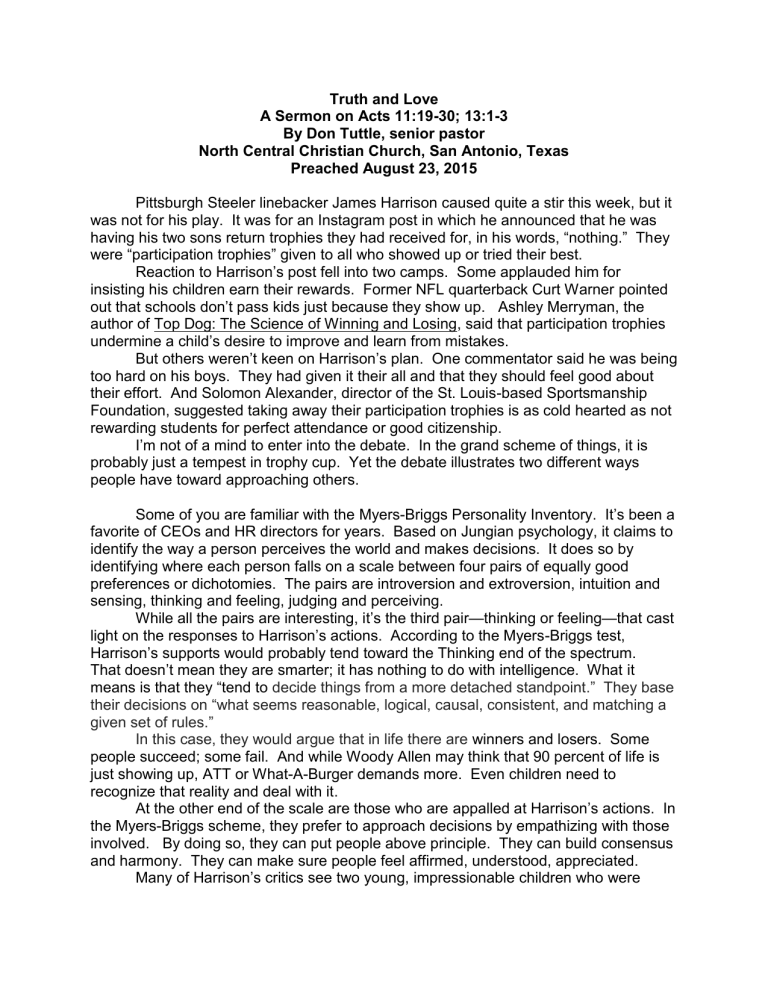
Truth and Love
A Sermon on Acts 11:19-30; 13:1-3
By Don Tuttle, senior pastor
North Central Christian Church, San Antonio, Texas
Preached August 23, 2015
Pittsburgh Steeler linebacker James Harrison caused quite a stir this week, but it was not for his play. It was for an Instagram post in which he announced that he was having his two sons return trophies they had received for, in his words, “nothing.” They were “participation trophies” given to all who showed up or tried their best.
Reaction to Harrison’s post fell into two camps. Some applauded him for insisting his children earn their rewards. Former NFL quarterback Curt Warner pointed out that schoo ls don’t pass kids just because they show up. Ashley Merryman, the author of Top Dog: The Science of Winning and Losing, said that participation trophies undermine a child’s desire to improve and learn from mistakes.
But others were n’t keen on Harrison’s plan. One commentator said he was being too hard on his boys. They had given it their all and that they should feel good about their effort. And Solomon Alexander, director of the St. Louis-based Sportsmanship
Foundation, suggested taking away their participation trophies is as cold hearted as not rewarding students for perfect attendance or good citizenship.
I
’m not of a mind to enter into the debate. In the grand scheme of things, it is probably just a tempest in trophy cup. Yet the debate illustrates two different ways people have toward approaching others.
Some of you are familiar with the Myers-Briggs Personality Inventory
. It’s been a favorite of CEOs and HR directors for years. Based on Jungian psychology, it claims to identify the way a person perceives the world and makes decisions. It does so by identifying where each person falls on a scale between four pairs of equally good preferences or dichotomies. The pairs are introversion and extroversion, intuition and sensing, thinking and feeling, judging and perceiving.
While all the pairs are interesting, it
’s the third pair—thinking or feeling—that cast light on the responses to Harrison’s actions. According to the Myers-Briggs test,
Harrison’s supports would probably tend toward the Thinking end of the spectrum.
That doesn
’t mean they are smarter; it has nothing to do with intelligence. What it means is that they “tend to decide things from a more detached standpoint
.” They base their decisions on “what seems reasonable, logical, causal, consistent, and matching a given set of rules.
”
In this case, they would argue that in life there are winners and losers. Some people succeed; some fail. And while Woody Allen may think that 90 percent of life is just showing up, ATT or What-A-Burger demands more. Even children need to recognize that reality and deal with it.
At the other end of the scale are those who are appalled at Harrison’s actions. In the Myers-Briggs scheme, they prefer to approach decisions by empathizing with those involved. By doing so, they can put people above principle. They can build consensus and harmony. They can make sure people feel affirmed, understood, appreciated.
Many of Harrison’s critics see two young, impressionable children who were
2 probably excited about and proud of the hardware they
’d received. And while they might sympathize with Harrison in principle, nothing justifies the psychological pain the children will experience by sending back their trophies.
In short, Thinkers tend to value principle over people while Feelers value people over principle.
Of course, this distinction is not limited to debates on the value of participation trophies. Dr. Timothy Keller suggests a version of it deeply affects our approach to
Christianity. For Keller, the difference is best cast as a difference between Truth and
Love.
For some followers of Jesus, what matters most is truth. I grew up around churches that measured the devotion of others by adherence to an orthodox understanding of the faith. They stressed commitment and taught that followers of
Christ have a duty to worship God weekly, to study the Bible faithfully, to live lives of holiness, and to humbly serve others. They believed that those who strayed theologically, spiritually or ethically were to be confronted with their failure and called to repentance. It was the truth of the faith that mattered most.
On the other hand, there are those who value love above all else. Those in this camp tend to see affirmation as the
Christian’s highest calling. When they approach another —be it a fellow Christian or someone outside the faith—their default position is one of empathy, understanding, acceptance. They might agree that someone has sinned or that God has expectations for his people, but ultimately what people believe or do is less important to them than helping people to feel loved and accepted.
Affirmation matters most.
Of course, it would be nice if we could just pick one or the other. Unfortunately, that is not possible. That’s because we cannot grow as followers of Christ without both.
Truth without love is stifling. It weighs people down. It undermines their confidence. It builds resentments. But love uncoupled from truth is vacuous. It never challenges people or forces them to look within. It simply affirms their spiritual status quo.
If we are to come to faith, if we are to grow in the faith, then we need people who will love us enough to tell them the truth. We need people who can, as Ephesians suggests, “speak the truth in love.”
That is the significance of Barnabas in our reading.
This is the third time Barnabas has been mentioned in Acts. In chapter four, he is said to have a sold a field and given the proceeds to the church. In chapter nine, he went out to meet the recently converted Paul and then vouched for him before the understandably wary apostles. Now here, in chapter 11, those same apostles hear that a large number of Gentiles have turned to Christ and send Barnabas to Antioch to investigate.
Barnabas is a logical choice for the task. For one, he obviously has the respect of the apostles. For another, he is a Jew from Cyprus and some of those who had shared the Gospel with the Gentiles hailed from there as well. And, beyond that,
Barnabas’ roots gave him an understanding of the Greek world that those who’d never traveled outside Jewish territory might not have.
3
When Barnabas arrives, he is excited by what he sees taking place. God is clearly at work among the people of Antioch —both Jews and Gentiles. And Barnabas rejoices in that fact. But it is what else that Barnabas does that deserves our attention.
According to verse
23, “he exhorted them all to remain faithful to the Lord with steadfast purpose ” or “steadfastness of heart.” Now the word translated “exhorted” is an interesting one. It is the Greek word “parakaleo.” Other translations render it
“encouraged” or “urged” or even “beseeched.” The problem is that there is not true
English equivalent for “parakaleo” and none of these words capture its essence.
Keller points out that the two parts of “parakaleo” are in tension. “Para” means
“to come alongside.” It is a soft or gentle word that suggests support, comfort, encouragement or help. Think
“paralegal” or “paramedic,” for example.
But “kaleo” is a strong word. It can mean something as benign as “call” or “invite” but it often connotes “to challenge, irritate or provoke.” It points people toward a goal the way a drill sergeant “calls” or “challenges” raw recruits to scale a wall.
What that suggests is that words like “exhort,” “encourage,” “urge” and the like are inadequate to convey the nature of Barnabas’ ministry. Yes, he affirmed their newfound faith, but he also challenged them to live by its truth. Yes, he celebrated their new life in Christ, but he provoked them to a deeper understanding and commitment to its doctrines and practices. He loved them and he challenged them with the truth.
Because he did, so many people came to faith that Barnabas had to go to Tarsus and bring Paul to Antioch to help him. People also began to live their faith so profoundly and publicly that for the first time people took notice and dubbed them
“Christians.”
That could never have happened with just truth or just love. To grow, they needed both.
Of course, Barnabas was not the first to recognize the importance of both truth and love. He was merely following in the way of Christ.
In his Gospel, John spends several chapters recounting Jesus’s attempts to prepare the disciples for his arrest, crucifixion, resurrection and ascension. He kept telling them that he was going away, and they kept saying they would go with him because they didn’t understand what he meant.
Finally, he tells them that his leaving is a good thing because when he ’s gone he will send the Holy Spirit in his place. He says that he will send “another Helper” or
“another Advocate” or “another Comforter.”
Any guess what word Jesus uses to describe that other Helper?
“Paraclete”—the noun form of the very word used in Acts to describe Barnabas’ ministry.
Here Jesus tells the disciples that he was the first come alongside them and proclaim the truth of the kingdom of God, but when he goes away the Holy Spirit will both love them and guide them in the truth.
That
’s why it’s no coincidence that, immediately after recounting the success of his ministry in Antioch, Luke tells us that Barnabas was “a good man, full of the Holy
Spirit and of faith.” What allowed him to balance love and truth was the presence of the
Spirit, the presence of Christ, in him.
In a sermon on this text, Keller suggests that we are at a cultural moment where
4 both truth and love are desperately needed. For one, all around us are people who
’ve come from families or churches or cultures where truth is everything and where the greatest sin is not idolatry but the failure to conform. And whatever life may be stirring within those folk is being buried under the weight of guilt and shame.
And yet beside them are people who ’ve pursued their every dream and fulfilled their every desire. They ’ve heard the culture applaud them for their courage and affirm them for breaking all the rules. And yet they too are dying, haunted by an emptiness that their pursuits have not and cannot fill.
If you are one of those people, look around you. There are good people here, full of the Holy Spirit and faith. If you will allow them, they will come alongside you to love you and share with you the truth of life in Jesus Christ. They are people willing to be your Barnabas and help you to grow.
But maybe you are already strong in the faith. Maybe you are already motivated by the truth of the faith. When then are to you do? Look around you. There are people who need the wisdom and experience you have to offer. They need a Barnabas. They need you.

